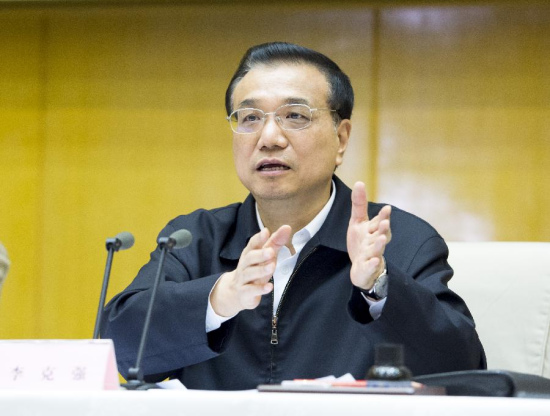
Chinese Premier Li Keqiang speaks during a national teleconference on streamlining administration procedures and scaling back government controls in Beijing, capital of China, May 12, 2015. (Xinhua/Wang Ye)
Chinese Premier Li Keqiang called for more efforts to streamline administration procedures and scale back government controls to unleash economic vitality.
The government will cancel more approval items, make enterprise registration easier and waive administrative charges it deems unreasonable this year, Li said at a national teleconference of China's senior and middle-level officials.
The transformation of governmental functions should address people's concerns, improve government services and strengthen supervision to guarantee a transparent, orderly and just market environment, the premier said.
The meeting underlined the leadership's resolution to tackle the long-standing issue of red tape, in the hope of promoting a more streamlined and efficient economy.
Li stressed encouragement of start-ups and innovation as well as enhancing services in employment, financing and intellectual property, so as to attract valid investment and realize easy and fair services for all people.
He also urged stronger monitoring of big data, cloud computing and "Internet Plus" put forward by Li which means the integration of the Internet and traditional industries through online platforms and IT technology.
There has been some progress in simplifying government procedures and streamlining government functions in the past few years, but the premier said there was still a big gap between actual results and people's expectations.
Last Wednesday, during a State Council meeting, the premier expressed his displeasure at excessive regulation and red tape, ridiculing scenarios in which citizens were asked to prove "your mother is your mother" when obtaining a government permit.
Fighting red tape has become more pressing as China's growth slows, and reform measures rolled out to steer the economy away from its unsustainable model, powered by state-directed investment, to more vital growth engines such as private consumption and services.
Since 2013, the premier has championed the streamlining of administrative approval and the slashing of red tape to help the market function efficiently.
Central government departments controlled 1,526 approval items in 2013. By the end of 2014, about a third have been canceled or delegated to lower agencies. A total of 205 were abolished last year and another 248 will follow this year.
China's economic growth slowed to 7 percent in the first quarter, the lowest level in six years, and latest indicators pointed to continued weakness in the second quarter, which makes finding new growth more urgent.
By streamlining administration and delegating powers, the country aims to encourage both foreign investors and domestic would-be entrepreneurs, who have long complained that it is hard to get bank loans and bureaucracy makes it difficult to start a business.
Currently, before an investment project is officially approved, a company often needs stamps of approval from more than 30 government departments.
Xu Shaoshi, head of China's top economic planner, has said the number of such steps will be reduced to two to three by the end of 2015.
Meanwhile, thanks to a new business registration policy, which took effect in March last year, the number of newly-founded companies in China surged almost 46 percent year on year to 3.65 million in 2014, with their total registered capital hitting 19.05 trillion yuan (3.11 trillion U.S. dollars), up 99 percent, official data showed.
The country's campaign of cutting red tape has become more detailed with higher efficiency, said Zhang Liqun, a researcher at the State Council's development research center.
He believed the role of government shall be changed from controlling to serving, just as a waiter ready to take orders from people as customers.
Liu Enzhuan, a Tianjin-based FTZ economist, illustrated the meaning of such campaign, citing Chinese tardy customs clearance with fussy red tapes hinder free trade with foreign countries, and only establishing domestic FTZ first with less approvals can help gradually adapt to global rules.
A free trade zone was inaugurated in Shanghai in September 2013 as a testing ground for market policies that reduce government controls and give markets a "decisive" role for allocating resources in the world's second-largest economy.
As of late April, the free trade zone has seen 73,900 registered enterprises, of which more than 16,300 are overseas-funded firms, according to official statistics.
















































